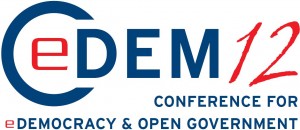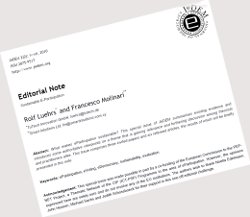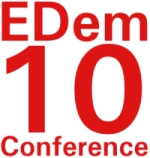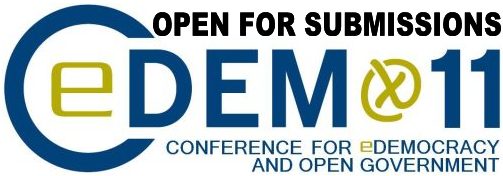CeDEM12 presents the following tracks:
- E-Participation

- Government 2.0
- Social/Web Media and Public Administration
- E-Politics and E-Campaigning
- European Citizen Initiative
- Participatory Budgeting
- Bottom-Up Movements
- Open Data and Open Access
Publications:
The conference proceedings will be published with the Edition Danube University; additionally, the complete proceedings will be made accessible online. A selection of best research papers and case studies of CeDEM12 will be published with the Open Access eJournal of eDemocracy and Open Government. (www.jedem.org)
- Research papers shall be 12 pages maximum and will be double-blind peer-reviewed.
- Case studies/project papers shall be 12 pages maximum and will be double-blind peer-reviewed.
- Reflections shall be 4 pages maximum and will be selected by the chairs.
You can download last year’s conference proceedings at the conference website!
Important Dates:
- Deadline for the submission of papers and workshop proposals: 12 December 2011
- Conference: 3-4 May 2012
Further Information
.
16 January 2011
Conference for E-Democracy and Open Government
5-6 May 2011
Krems, Austria
www.donau-uni.ac.at/cedem
Tracks
- E-Participation
- Open Data and Open Access
- Open Government
- E-Voting
Submissions
- Extended deadline: 16 January 2011
- 12 pages maximum
- Double-blind peer review
Conference Proceedings
- Print version and
- OA online version (eBook).
- Best papers will be published with the OA eJournal JeDEM
Detailed Information
]]>
The PEP-NET Special Issue of eJournal of eDemocracy (JeDEM), which Francesco Molinari and Rolf Lührs guest edited, is now available at www.jedem.org. It addresses the topic “sustainable eParticipation”, asking what ‘sustainable’ means in this context and turning to experts in the field for advice on ensuring European eParticipation projects overcome problems with low participation rates and impact.
The Special Issue contains a total of nine papers, three of which are invited papers from prominent eParticipation actors. The remaining six are scientific research papers and case studies.
The authors are successful in shedding new light on eParticipation, with a wealth of hints and tips on how to make eParticipation sustainable. Here is a list of concrete prerequisites for sustainable eParticipation gathered from the various papers as part of the editorial:
– A favourable policy and legislative framework (Chrissafis and Rohen, Hinsberg);
– Official recognition from the public decision-makers (Badouard);
– Efficient (Velikanov) and transparent (Johnston) procedures for the aggregation and visualisation of user preferences;
– Trust building on the whole process (Rodrigues Filho);
– A suitable ICT infrastructure (Hinsberg, Hermida) posing weak constraints on users’ behaviour (Badouard) and making the most out of the inputs (Li);
– A community of active (Hinsberg) and skilled (Maier-Rabler and Huber) citizens;
– A participatory culture among the population (Li, Maier-Rabler and Huber).
Of course it is not possible to distil the whole journal into a single blog post – you will simply have to read the journal to benefit from the wealth of knowledge and experience that it reflects by visting https://www.jedem.org/.
The journal was ready in time for last week’s PEP-NET Summit, at which the issue of sustainability was also raised. Like the Summit, the JeDEM Special Issue benefited from PEP-NET’s unique network of eParticipation actors across Europe and will help to ensure that there is ongoing reflection on how eParticipation can make a positive, long-term contribution to our democratic culture. JeDEM is published twice per year since first being published in 2009. The Centre for E-Government at the Danube University in Krems, Austria, manages the publication process which involves a team of 35 editors.
]]> According to the latest UN E-Participation Index measurement, the majority of South Eastern European countries improved their global standing regarding the quality and usefulness of information and services for the purpose of engaging its citizens in public policy making through the use of e-government programs. Nevertheless, e-participation in SEE countries is still falling behind their e-government developments. An overview of current e-participation situation in SEE within government domain will be presented, highlighting key elements needed for strengthening e-democracy in the region. One of them will be focused on non-governmental organizations and civil society e-participation experience (e.g. on-line Citizen’s forum) needed for shaping inclusive and citizens oriented e-government policy.
According to the latest UN E-Participation Index measurement, the majority of South Eastern European countries improved their global standing regarding the quality and usefulness of information and services for the purpose of engaging its citizens in public policy making through the use of e-government programs. Nevertheless, e-participation in SEE countries is still falling behind their e-government developments. An overview of current e-participation situation in SEE within government domain will be presented, highlighting key elements needed for strengthening e-democracy in the region. One of them will be focused on non-governmental organizations and civil society e-participation experience (e.g. on-line Citizen’s forum) needed for shaping inclusive and citizens oriented e-government policy.
Link to video lecture: https://videolectures.net/forum2010_delakorda_meis/
Link to presentation: https://www.inepa.si/images/stories/mapping_edemocracy_see_region_delakorda.pdf.
Lecture presented by Simon Delakorda, M. Sc., executive director, Institute for Electronic Participation (INePA) and member of the Central and Eastern Citizens Network eParticipation expert group.
]]>
Photo of Nick Booth by aeioux on Flickr.com
Before becoming a social-media consultant and founding Birmingham-based Podnosh, Nick Booth was a BBC journalist and then ran a government quango. He advises public administrations on using social media, is involved in many projects that promote active citizenship, and is a major player on the UK’s eParticipation scene. Nick is regularly invited to speak at conferences on social media.
JH: Hi Nick. Thanks for taking the time to be interviewed for PEP-NET. First question: what does eParticipation mean to you?
NB: Hello. Podnosh does two things: on the one hand, we help citizens use social media to become active in their local communities; on the other hand, we work with public administrations — for example the Audit Commission, Birmingham City Council, Be Birmingham, FutureBuilders, and neighbourhood managements — to make sure that they listen to these conversations and take part in them.
So for me, eParticipation is more about employees of public administrations and politicians participating in discussions that are happening “out there” than citizens participating in online consultations that public administrations set up. The internet is changing society and public administrations need to adapt, not the other way round.
JH: That’s a really interesting view of eParticipation. So what examples do you have of conversations that public administrations could have “eParticipated” in better?
NB: One example with huge potential for public administrations and citizens to work together is a website that I run: it’s called “Help Me Investigate“. Anybody can ask a question, which people work together to answer. Public administration officials can help a lot by providing information to help people get answers. That is real transparency, but it requires a shift in attitudes so that public administration officials feel able to answer the questions the public want answered, not just ask the public questions that they want answers to.
I live and work in Birmingham, which has plenty more examples where citizens have taken the time to create solutions to problems instead of moaning about their local government. When the City Council consulted on a plan to undertake a major redevelopment of the city centre, they uploaded a PDF document to their website and invited comments via email. Many people in Birmingham thought this was a bit old-fashioned, so they created a website called “Big City Talk“: the group paraphrased the document in more understandable English, and posted each paragraph individually so that people could comment on — and discuss — specific parts of the document.
Then there’s the “BCC DIY” example: when Birmingham City Council unveiled its new website last year, it was felt to be overpriced at £2.8m and not up to scratch. So Stef Lewandowski organised a group of people to spend a day developing a website that would show what a local authority’s website should look like.
JH: I wrote about some examples on PEP-NET a while ago. So how does your work help local authority officers take account of what’s going on “out there”?
NB: One example is our work with Neighbourhood Managers. Podnosh works with them to develop blogging platforms that have built-in monitoring tools that sift through the masses of information on the internet and notify them of information about the local area. That’s not the end of the story — it’s important that neighbourhood managers use the blog and participate in the conversations that are happening online. We also offer “social media surgeries” in the neighbourhoods to help residents use the blogs. This is really important because unless citizens know why and how they should use these tools, they are unlikely to be successful.
JH: The social media surgery is a model that you developed isn’t it? Tell me a bit more about that.
NB: It’s really simple: a group of bloggers from Birmingham volunteered to help voluntary organisations and anybody interesting in starting a blog about their local area get started in using social media. We kept it as uncomplicated as possible: we booked a room with wifi, volunteers brought their laptops, and anybody who wanted to try out social media was invited to come along and learn from them on a one-to-one basis, for free. Now the same thing happens every month in Birmingham, and the model has been adopted in other parts of the city, in other cities and even countries.
I’m working on a website that will allow anybody to set up social media surgeries with some tools to help them, and also collect information about how successful they are and how they can improve the surgeries.
JH: It sounds like you’re really busy, so I’ll just ask you one last question! Where do you see the future of eParticipation?
NB: It’s all about mobile phones. People often say that lack of internet access leads to digital exclusion, but so many people access the internet through mobile phones that this is an increasingly important channel.
JH: Thanks for you time Nick. Keep us up-to-date with what you’re doing!
NB: You’re welcome. Will do.
]]>According to the latest UN E-Participation Index measurement, the majority of South East Europe countries (Albania, Croatia, FYR Macedonia, Moldova, Montenegro and Romania), improved their global standing regarding the quality and usefulness of information and services for the purpose of engaging its citizens in public policy making through the use of e-government programs. Nevertheless, e-participation in SEE region is still falling behind their e-government developments. An overview of current e-participation situation in SEE within government domain is presented, highlighting key elements needed for strengthening e-democracy in the region. One of them is focusing on non-governmental organizations and civil society e-participation experience (e.g. on-line Citizen’s forum) needed for shaping inclusive and citizens oriented e-government policy.
Presentation slides are available at the Institute for Electronic Participation web site https://www.inepa.si/images/stories/mapping_edemocracy_see_region_delakorda.pdf (pdf, 1.49 mb).
As has become customary over the years the conference concluded with a draft declaration, which had been adopted by the participants of the conference. The process of formulating the declaration is based upon the main issues presented by the lecturers and highlighted by the participants in the discussions which followed.
To achieve even wider participation in the formulation of the Final Declaration of the 11th Bled Forum on Europe, your are kindly invited to provide comments, inputs, questions, add issues important to the development of information society not only in South East Europe, but around the world.
Please send your comments or your video responses to info.cegd@cegd.eu until the 12th of April 2010 and make sure your voice is heard and your opinion is included in the final declaration. You can publish your comments directly to European Debates on-line forum facilitated by the Institute for Electronic Participation (INePA) by fulfilling discussion form (Please enter your Username – Uporabniško ime, message Confirmation code – Potrditvena koda and submit your comment – Pošlji. No prior forum registration is required. Forum is also available in English language). The forum is providing a deliberation space for facilitated public debates and consultations on relevant European issues.
Web links to relevant sites:
Draft declaration of the 11th Bled Forum (pdf, 71 kb)
European Debates on-line forum
Simon Delakorda, M.Sc.
Institute for Electronic Participation
 Extended Call for Papers
Extended Call for Papers
You can submit a paper at the conference website until
1st of March 2010. EDem10 unites many different disciplines and promotes interdisciplinary approaches to E-Democracy. On primary aim is to bring together researchers and practitioners. We would like to invite individuals from academic, applied and practitioner backgrounds as well as public administration offices, public bodies, NGO/NPOs, education institutions and independent organisations to submit their research and project papers.
Registration
Please visit the conference website to register at EDem10. Members of PEP-NET benefit from reduced fees; please indicate your Special Status when registering! Conference Date: 6th and 7th of May 2010.
Programme
We are still working on the programme, but confirmed keynote speakers and workshops promise an exceptional event. There will be a PEP-NET Workshop! Please visit the Conference Website for details and regular updates.
Confirmed Keynote Speakers
- Stevan Harnad – American Scientist Open Access Forum; Universite du Quebec a Montreal, CAN; University of Southampton, UK
- Ismael Peña-López – Open University of Catalonia, School of Law and Political Science, Barcelona, Spain
- Jochen Scholl – The Information School, University of Washington, USA
- Micah L. Sifry – Personal Democracy Forum, TechPresident, New York, USA
- Andy Williamson – Hansard Society, London, UK
Further Information
]]>Mark Rakar is a passionate man. During the visit of the French National Assembly, proposed to the participants of the last World eDemocracy Forum, he enjoyed every moment and every picture. Curious by nature, quoting the American strategist Joe Trippi and convinced that an electoral campaign is “too serious matter to be left to political parties”, it was not a surprise that he is one of Top 10 Who Are Changing the World of Internet and Politics. During the eDemocracy Awards workshop, last october, he explained how Pollitika.com strengthened democracy in Croatie.
]]>
I wrote an overview about the tool and the Wave protocol earlier on this blog and promised to take a look at its possible implications for eParticipation. Luckily Tim Bonnemann started a discussion on how to use Google Wave for eParticipation using the tool itself as soon at it was available. If you have a Wave account you can be view it here. In this article I will try to give the major points which have been made in that discussion. All the ideas presented in this text have been developed collaboratively by the 59 people have signed into this Wave until now. Thanks to all the contributors and especially Tim for starting the Wave!
From a usability standpoint two things have to be pointed out: Google Wave is technically still in a preview phase and is having errors and problems quite frequently at the time. Secondly the implementation of the Wave Protocol presented by Google is offering a lot of features in a rather crowded interface which needs to be learned and get used to by new users. However this might change over time.
Besides these general problems several use cases for the tool have risen from the discussion. These points are however mainly ideas at the time and have to be tested in practice.
- Small-group dialogues
- Facilitated chat
- Team-based, game-like deliberations
- “Wave as a debate host” (see this blog post on ReadWriteWeb)
- „Wavestorming“
- To support group process, participant interaction (e.g. by detecting mood… could jump in if mood deteriorates)
- Real-time translation (this could be really useful in places like Europe. 27 EU countries and almost as many different languages)
- Collaborative editing/commenting of legislative texts
- Rearranging discussions into reports that policy-makers can understand.
- Collectively describing a problem or an issue.
Alongside these ideas two concrete example of Google Wave in policy discussions have been posted: One on the debate on Health Care reform in the United States and one on a discussion on a legislative text. Both examples are interesting but illustrate the usability problems mentioned above. The discussions are hard to follow and get very “noisy” even with a rather small number of participants.
Several participants in the Wave on eParticipation brought up the issue of intellectual property. Right now Google hosts all the content on Wave and even though the company states that they do not claim any ownership this situation might be problematic when the tool is used for public participation in political processes. In the long run however any entity (governments, NGOs, etc.) can host their own instances of Wave independent from Google, which might be more comfortable for the participants and the hosts of the discussion.
At this point Wave is an invite only service. This fact of course is a showstopper for public participation processes but will change in the next few months. I have a few invites left. So if you need one just post the email address you need it to in a comment or contact me via email.
In summary Google Wave is still in a very early stage and is ridden with problems and limitations. It does not seem to be ready for wide use by non-technical minded people and therefore for public participation processes. On the other hand it could be very useful in supporting these processes. Moderators could use it to coordinate and to produce summaries of discussions. Or teams of translators could work in Wave in a multi-lingual setting.
It is unclear how Wave will develop over the next few months and how the adaption will be when it is opened up to all users and independent instances of the Wave protocol show up on the net. Therefore the points made here can only be seen as hints to what Wave might mean for eParticipation.
]]>
